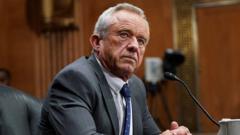In a 14-13 party-line vote, Kennedy gained support from Republicans despite significant scrutiny over his vaccine skepticism and previous health-related comments. The nomination now heads to the full Senate where Republicans hold a slight majority.
RFK Jr. Advances to Full Senate Vote for Health Secretary Nomination

RFK Jr. Advances to Full Senate Vote for Health Secretary Nomination
Robert F. Kennedy Jr. has successfully passed a crucial Senate committee vote, moving him closer to his confirmation as US health secretary.
Kennedy's nomination faced intense questioning over his health views, particularly regarding vaccines, during the Senate Finance Committee hearings. Although he asserted that he does not oppose vaccines outright, he reiterated calls for stronger safety regulations. His previous controversial remarks, especially insinuating that no vaccine is entirely "safe and effective," did not sit well with many senators.
Independent Senator Bernie Sanders initially commended Kennedy’s health initiative slogan but contrasted it with merchandise promoting anti-vaccine rhetoric associated with Kennedy's former organization. However, Kennedy responded that he stepped away from direct management of the group.
Notably, Kennedy did garner support from Senator Bill Cassidy, a Republican and physician who had previously expressed doubts regarding Kennedy’s candidacy. This support was crucial in advancing his nomination to the next stage, scheduled for a full Senate vote.
Kennedy, who is the son of the late Senator Robert F. Kennedy and nephew to President John F. Kennedy, has transitioned from an environmental lawyer to a prominent figure in the health debate, often criticizing various elements of the American healthcare system. His confirmation, if successful, would place him in control of major health agencies, with implications for vaccine policy, food safety, and medical regulations.
As secretary, Kennedy hinted at potential staff changes within the federal health agencies and stated he would focus on the concerns surrounding food additives, advocating for reforms rather than outright bans on vaccines or certain food products.
In summary, while Kennedy's nomination has cleared a significant hurdle, it also raises serious discussions about the future of health policy in the US amidst ongoing debates about vaccine safety and public health measures.
Independent Senator Bernie Sanders initially commended Kennedy’s health initiative slogan but contrasted it with merchandise promoting anti-vaccine rhetoric associated with Kennedy's former organization. However, Kennedy responded that he stepped away from direct management of the group.
Notably, Kennedy did garner support from Senator Bill Cassidy, a Republican and physician who had previously expressed doubts regarding Kennedy’s candidacy. This support was crucial in advancing his nomination to the next stage, scheduled for a full Senate vote.
Kennedy, who is the son of the late Senator Robert F. Kennedy and nephew to President John F. Kennedy, has transitioned from an environmental lawyer to a prominent figure in the health debate, often criticizing various elements of the American healthcare system. His confirmation, if successful, would place him in control of major health agencies, with implications for vaccine policy, food safety, and medical regulations.
As secretary, Kennedy hinted at potential staff changes within the federal health agencies and stated he would focus on the concerns surrounding food additives, advocating for reforms rather than outright bans on vaccines or certain food products.
In summary, while Kennedy's nomination has cleared a significant hurdle, it also raises serious discussions about the future of health policy in the US amidst ongoing debates about vaccine safety and public health measures.





















